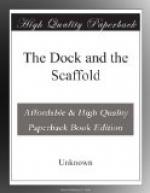PRISONER—I must then state, in conclusion, that while I protest against the jurisdiction, I am confident that the position which I take will be sustained. I know that the verdict of the jury will be reversed, and while returning you, my lord, thanks for your kindness during the trial, I must say you have taken from me the privilege I am entitled to get. I am sure that I shall live longer than the British Constitution.
* * * * *
AUGUSTINE E. COSTELLO.
After the verdict had been returned against Colonel Warren, Augustine E. Costello was put on his trial, charged with the same offence—that of having formed cne of the invading party who landed from the “Erin’s Hope,” in the neighbourhood of Dungarvan. He, too, was an adopted citizen of the United States, and he declared that he was anxious to follow the course that had been taken by his friend, Colonel Warren, in reference to his trial; but, deferring to the strongly-expressed wish of his counsel, he would leave his case in their hands. An able defence was made for him by Messrs. Heron and Molloy, Q.C., instructed by Mr. Scallan, Solicitor; but it was all in vain. When he was called on to say why sentence should not be pronounced on him, he delivered the following address in a loud tone of voice, his fresh young face glowing with emotion as he spoke, and his manner showing deep excitement, but withal a fearless and noble spirit:—
In answer to the question put to me by the Clerk of the Court, I will speak a few words. I don’t intend to say much, and I will trespass on foibidden ground but as little as possible. I am perfectly satisfied that there has not been one fact established or proved that would justify a conscientious and impartial jury in finding me guilty of treason-felony. There is an extreme paucity of evidence against me;—that everyone who has been here while this case has been proceeded with will admit frankly and candidly. We need no stronger proof of this fact than that the first jury that was empanelled to try me had, after a long and patient hearing of the case, to be discharged without having found me guilty of treason-felony. Ah! there were a few honest men on that jury. They knew that Augustine E. Costello was not guilty of the crime trumped up against him. They knew I was not guilty. Mr. Anderson, sitting there, knows that I am not a felon, but that I am an honest man; that as such I stand here in this dock, where Robert Emmett stood, where Robert Emmett spoke from; and the actions and the words of that Emmett have immortalized him, and he now lies embalmed in the hearts of the world.
The LORD CHIEF BARON—I
cannot allow you to proceed in that
strain.




